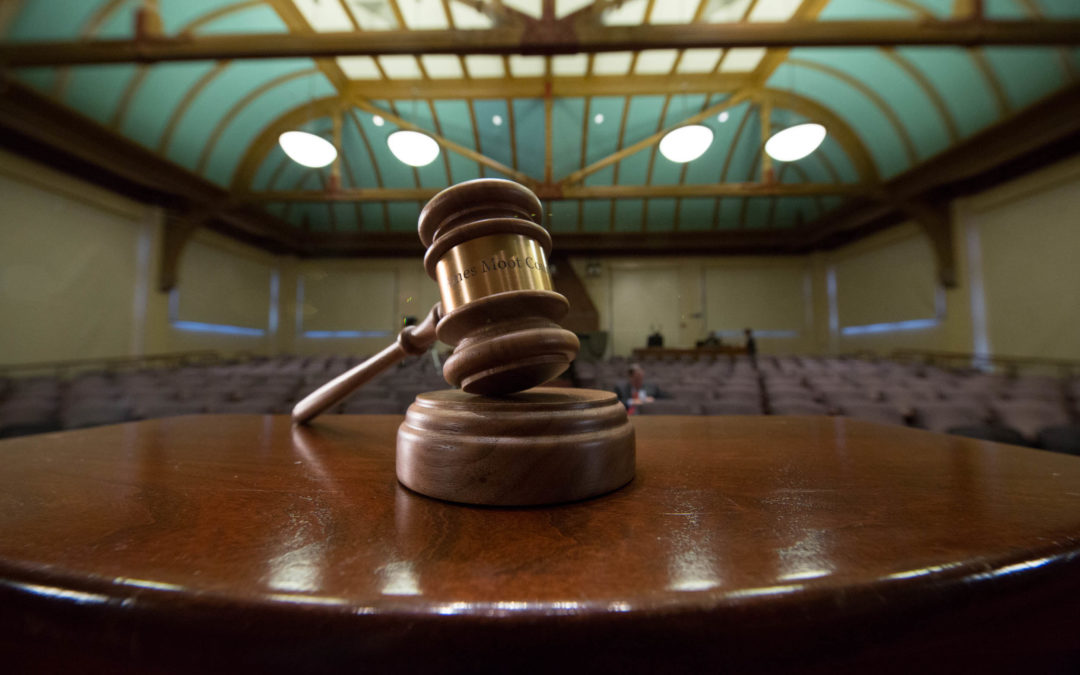Welcome to the 2019 Ames Final, live from Austin Hall in Cambridge, Massachusetts!
Live coverage begins at 7:30pm.
The following information is courtesy of the HLS BSAs. You can see all of tonight’s information, including copies of the briefs, here.
The Ames Competition is one of the most prestigious competitions for appellate brief writing and advocacy in the country. Students participating in the Final Round started the competition in the fall of their 2L year. From there, two teams progress to the Final Round through their strong research abilities and excellent written and oral advocacy. The Final Round is traditionally judged by this country’s preeminent jurists. Past Ames Competition winners include Professor Cass Sunstein, Dean Kathleen Sullivan, Massachusetts Governor Deval Patrick, and Justice Harry Blackmun. Click here for a list of past winners of the Competition.
The teams that competed in the 2019 Ames Final Round are below, as well as a summary of the case and the briefs submitted for the Final Round.
* * *
The Janet Wood Reno Memorial Team
Kevin Chen
Mikaela Gilbert-Lurie*
Eliza Green
K.C. Jaski
Al Kelly*
Caroline Li
The Patricia Roberts Harris Memorial Team
Alicia Alvero Koski
Charlotte Butash
Melanie Fontes*
Kelsey Fraser*
Hilary Hurd
Kate Peiffer
*Oralist
United States Department of the Interior v. Caldwell
In 2014, baby C.J., who was four months old, was placed in foster care with respondents Bryce and Candace Caldwell. Several years later, the Caldwells sought to adopt C.J. In conducting the adoption proceedings, the Ames state court followed the Indian Child Welfare Act (ICWA), which establishes “minimum Federal standards for the removal of Indian children from their families and the placement of such children in foster or adoptive homes.” 25 U.S.C. § 1902. The statute defines an “Indian child” to include a minor who “is eligible for membership in an Indian tribe and is the biological child of a member of an Indian tribe.” 25 U.S.C. § 1903(4)(b). C.J.’s biological father is an enrolled member of the Akava Nation, a federally recognized Indian tribe in Ames. And C.J. is eligible for membership in the Akava Nation under the tribal constitution because he is “of at least one-eighth degree Akava Nation Indian blood,” defined to mean “biological lineal descent” from Akava Nation members. C.J. thus qualifies as an “Indian child” under ICWA.
ICWA imposes duties on state agencies and prescribes procedural and substantive rules that state courts must follow. Among other provisions, ICWA establishes placement preferences for adoptive proceedings involving Indian children, providing a preference, “in the absence of good cause to the contrary, to a placement with “(1) a member of the child’s extended family; (2) other members of the Indian child’s tribe; or (3) other Indian families.” 25 U.S.C. § 1915(a).
After the Caldwells filed a petition to adopt C.J., the Akava Nation identified an alternative adoptive couple who were members of a different Indian tribe in Ames and so ranked above the Caldwells under ICWA’s placement preferences. The family court denied the Caldwells’ adoption petition, finding that good cause did not exist to depart from ICWA’s placement preferences. But the other couple ultimately could not adopt C.J. due to health issues.
The Caldwells and the State of Ames thereafter jointly filed this suit in federal court against petitioners, who are federal agencies and officials charged with administering ICWA. Respondents argued that ICWA violates equal protection because it impermissibly mandates racial and ethnic preferences in the placement of Indian children. Respondents further contended that ICWA violates the anti-commandeering component of the Tenth Amendment because it imposes duties on state officials to carry out a federal program and displaces state substantive standards governing domestic relations. Petitioners responded that no equal protection problem exists because the statute permissibly differentiates children based on a political classification. And petitioners further asserted that the statute comports with the Tenth Amendment because it simply preempts state family law in certain respects and does not commandeer state officers. The district court granted summary judgment to respondents, but the Ames Circuit reversed and held that ICWA was unconstitutional on both grounds.
The Supreme Court granted certiorari to consider:
- Whether the Indian Child Welfare Act, 25 U.S.C. § 1901 et seq., and the final rule implementing the statute violate equal protection.
- Whether the Indian Child Welfare Act, 25 U.S.C. § 1901 et seq., and the final rule implementing the statute violate the anti-commandeering component of the Tenth Amendment.

